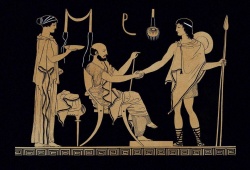How Hospitable are the Local Greeks?
When it comes to Greece, one cannot help but think of its rich history, stunning landscapes, and vibrant culture. However, another aspect that often stands out is the warm and welcoming nature of the Greek people. Hospitality has been a fundamental value in Greek society for centuries, with roots deeply embedded in ancient Greek traditions. In this article, we will explore the extent of Greek hospitality, examining its origins, cultural significance, and how it is experienced by both locals and visitors.
The Origins of Greek Hospitality
Greek hospitality, known as "philoxenia," has its roots in ancient Greece. In those times, travelers were considered sacred and were believed to be sent by the gods. This belief led to a strong cultural norm of welcoming strangers into one's home and providing them with food, shelter, and protection. This tradition was not only a moral obligation but also a way to gain favor from the gods.
Over time, philoxenia became deeply ingrained in Greek society and continues to be an essential part of Greek culture today. It is not uncommon for Greeks to go above and beyond to make guests feel comfortable and at home.
The Cultural Significance of Hospitality
Hospitality is highly valued in Greek culture and is seen as a reflection of one's character. Greeks take pride in their ability to make others feel welcome and often view it as a personal responsibility. This cultural norm extends beyond the home and can be observed in various aspects of Greek life, such as restaurants, shops, and even public spaces.
In Greece, it is customary to offer food or drinks to guests as a sign of hospitality. The concept of "xenitia" also plays a role in Greek hospitality. Xenitia refers to the feeling of longing for one's homeland when away. Greeks understand this sentiment and strive to create an environment that alleviates any feelings of homesickness for visitors.
Experiencing Greek Hospitality
Visitors to Greece often find themselves overwhelmed by the warmth and generosity of the locals. From the moment you step foot in the country, you are likely to be greeted with a friendly "kalimera" (good morning) or "kalispera" (good evening). Greeks are known for their genuine interest in others and their willingness to engage in conversation.
Whether you are dining at a local taverna or exploring a small village, you will likely be treated like family. Greeks are known for their love of food, and sharing a meal is a common way to connect with others. Don't be surprised if you are offered a taste of traditional dishes or invited to join in on a celebration or gathering.
Furthermore, Greeks are renowned for their willingness to help others. If you find yourself lost or in need of assistance, locals will often go out of their way to guide you or offer their support. This sense of community and genuine care for others is what sets Greek hospitality apart.
The Impact of Tourism
Tourism plays a significant role in Greece's economy, and the country welcomes millions of visitors each year. The Greek people understand the importance of tourism and its impact on their livelihoods. As a result, they strive to provide exceptional hospitality to ensure visitors have a positive experience.
However, it is worth noting that the influx of tourists has led to some changes in the way hospitality is experienced in popular tourist destinations. While the warmth and friendliness of the locals remain, some areas may feel more commercialized and less authentic. Nonetheless, even in tourist hotspots, Greek hospitality can still be found if you venture off the beaten path and explore lesser-known areas.
In conclusion, Greek hospitality, deeply rooted in ancient traditions, continues to be a defining characteristic of Greek culture. The warmth, generosity, and genuine care shown by the locals make Greece a welcoming destination for travelers from around the world. Whether you are exploring the historical sites of Athens or relaxing on the stunning beaches of the Greek islands, you are sure to experience the true essence of Greek hospitality. So, pack your bags, embrace the philoxenia, and prepare for an unforgettable journey through the land of the hospitable Greeks.








